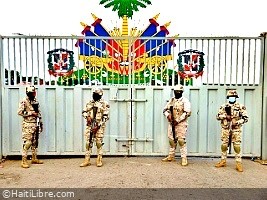|
||||||||||||||||||
|
|
Haiti - Social : Impact of the closure of the Dominican border on food insecurity 06/10/2023 09:22:13
The four departments (Northeast, North, Center, South-East and West), likely to be more affected by the closure of the Dominican border (land, sea and air) by the Dominican government following the initiative of the civil society of Ouanaminthe to resume the construction of a canal with a view to taking water from the Massacre River https://www.haitilibre.com/en/news-40503-haiti-flash-dr-closes-its-land-sea-and-air-borders-with-haiti-goods-and-passengers.html are already in a Crisis situation (IPC Phase 3), according to FEWS NET forecasts. "An increase in the population in crisis remains possible, at least in the short term. However, the impacts of the border closure will be mitigated by informal trade, seasonal food and income sources, and end-of-year festivities. The closure also comes at a time when food and income sources are reaching their seasonal peak in Haiti. Aside from condiments and certain market garden products, food products imported from the Dominican Republic have a relatively limited importance in the typical diet of Haitians (rice being the most important base in the typical diet of Haitians, and 95% (the supply of rice imported by Haiti comes from the United States). Furthermore, since the closure of the border, with the exception of certain products such as corn and eggs, whose prices have increased by approximately 20% on the markets of Cap-Haïtien and of Ouanaminthe, the general price trend remains stable or downward nationally. Despite the Dominican government's ultimatum demanding a halt to the construction of the canal, the Haitian government reaffirmed, during its speech at the 78th UN General Assembly, the right of Haitians to use water from the Massacre River, just like the Dominican Republic does. He pledged to continue the construction of this canal and called on the Ministry of Agriculture to take charge of the completion of this canal in order to meet the water needs of farmers. Consequently, the availability of irrigation water in the Maribaroux plain, the second largest rice-growing plain in the country, after the Artibonite plain, is likely to improve agricultural production in the communes of Ouanaminthe and Ferrier, at least in the medium term. Given that water is one of the main limiting factors to agricultural development in Haiti, the construction of this canal, as well as other canals along the Massacre River, in accordance with the wishes of the Haitian population, would promote recovery of national agricultural production and, therefore, improving local food availability in the near future. (*1) IPC Phase 3 : Acute food and livelihood crisis Acute and critical lack of access to food accompanied by severe and unusual malnutrition and accelerated depletion of livelihood assets which, if the situation continues, will cause the population to fall into Phase 4 or 5 and/or will likely result in chronic poverty; IPC Phase 4 : (Humanitarian Emergency) Serious lack of access to food accompanied by excessive mortality, very high and increasing malnutrition and irreversible depletion of livelihood assets. HL/ HaitiLibre
|
|
|
Why HaitiLibre ? |
Contact us |
Français
Copyright © 2010 - 2024 Haitilibre.com |



